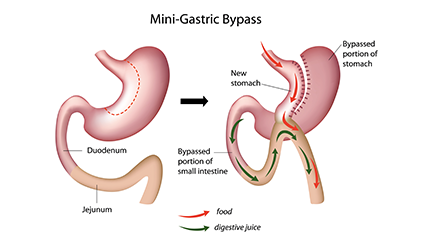Prevalence of Mini-Gastric Bypass

Recently, the mini gastric bypass procedure, originally developed by Dr.Robert Rutledge in 1997, has gained popularity among patients, as it is technically less complicated and has a lower risk of complications compared to traditional bypass surgery (MGB study, 2012).
Mini-gastric bypass surgery was developed to shorten operating time, simplifying the procedure and reducing the risk of complications after surgery. Recent studies have shown that mini-gastric bypass surgery does indeed shorten operating time, and can lead to similar weight loss, reduces risk and complications in comparison with traditional bypass surgery.
Unfortunately, today not all insurance carriers cover this surgical treatment, and surgeons must have specific knowledge, skill, and experience to perform mini-bypass surgery.
Mini Bypass Surgery – Advantages
The operation lasts approximately 50 - 60 minutes and is performed laparoscopically. During the operation, the patient’s stomach changes shape and shrinks.
Mini bypass surgery is an effective surgical treatment and has several advantages, including:
- Shorter operating time;
- less risk of complications;
- less complicated to perform;
- the procedure can be applied for patients who have not lost weight as a result of another surgical intervention and wish to find a more effective treatment;
- This leads to effective weight loss (up to 75% of body weight within 2 years);
- It’s an effective treatment for obesity-related diseases (type 2 diabetes, high blood pressure, arthritis pain, PCOS, etc.);
- Reduction in pressure on knees due to weight loss;
- Leads to improvements in quality of life and a faster recovery time;
- Results in reduced feelings of hunger by changing the signals coming from the intestines to the brain;
- Results in a reduction in the number of calories consumed post-op;
- Ensures a quick feeling of fullness, which leads to the consumption of healthy portion sizes of food.
One of the post-surgery complications is acid reflux since the second part of the patient’s stomach is still connected to the intestines. Mini gastric bypass surgery is not recommended to patients who already have symptoms of reflux disease (severe heartburn that requires treatment).
After surgery, patients will experience a certain amount of pain at the small incision sites; patients are usually asked to stay overnight in the hospital for observation. In some cases, patients may be kept an additional two more days in the clinic. In general, patients can stay in the clinic for an average of about three days. The overall recovery period lasts 2-3 weeks.
Once patients return home, they will be required to follow a strict diet. During the first two weeks after surgery patients will be required to consume liquid food under strict recommendations from their surgeon. Later, patients can consume soft food and after a month they can return to the consumption of solid food items; however, patients will be encouraged to follow a modified diet that includes more protein, vegetables, and fruit, since the stomach has reduced in size as a result of the surgery. It is definitely required to avoid binge eating and the consumption of unhealthy food. It is necessary to follow a healthy lifestyle.
After mini gastric bypass surgery, patients usually do not complain of severe pain, however, minor pain may appear within the first two weeks, especially as a consequence of certain positions or movements of the body. Doctors usually recommend avoiding prolonged bedtime and too much moving around in the days following the surgery. The first few days, patients can walk around the house and a week later they can engage in 20-minute walks twice a day. It is necessary to gradually increase physical activity with each week after surgery, but, first of all, to follow the instructions from the surgeon. Patients need to be prepared to feel tired, as they will lose weight and switch to a low-calorie diet. However, thanks to a regular exercise routine, the body adjusts quickly and patients enjoy an increase in their quality of life.
The risk of complications after surgery remains low and ranges in severity from minor to significant. Sometimes complications include hernias at the surgical site, ulcers, and minor incision infections. Major complications usually occur within the first three weeks after surgery, such as pulmonary embolisms as well as other risks. These complications should be addressed by the surgeon immediately. Before surgery, patients should be informed of the side effects, signs, and symptoms of these complications.
Before mini gastric bypass surgery, it is necessary to have a consultation and undergo a health check-up, and it is also recommended to:
- Be active - daily walks will help you physically and mentally prepare for the surgery. Try to take 30-minute short walks;
- Eat healthily - analyze your diet. Lowering your calorie intake and drinking more water can enhance the final positive result;
- Take care of your health in a general sense - inform your physician about your intentions and learn about his/her recommendations, considering your health condition;
- stop drinking alcohol at least 2 weeks before surgery. This will not only help you control your calorie intake, but it will also reduce food cravings.
Remember that long-term recovery depends solely on you - follow a healthy lifestyle and diet, as well as actively engage in various sports.
